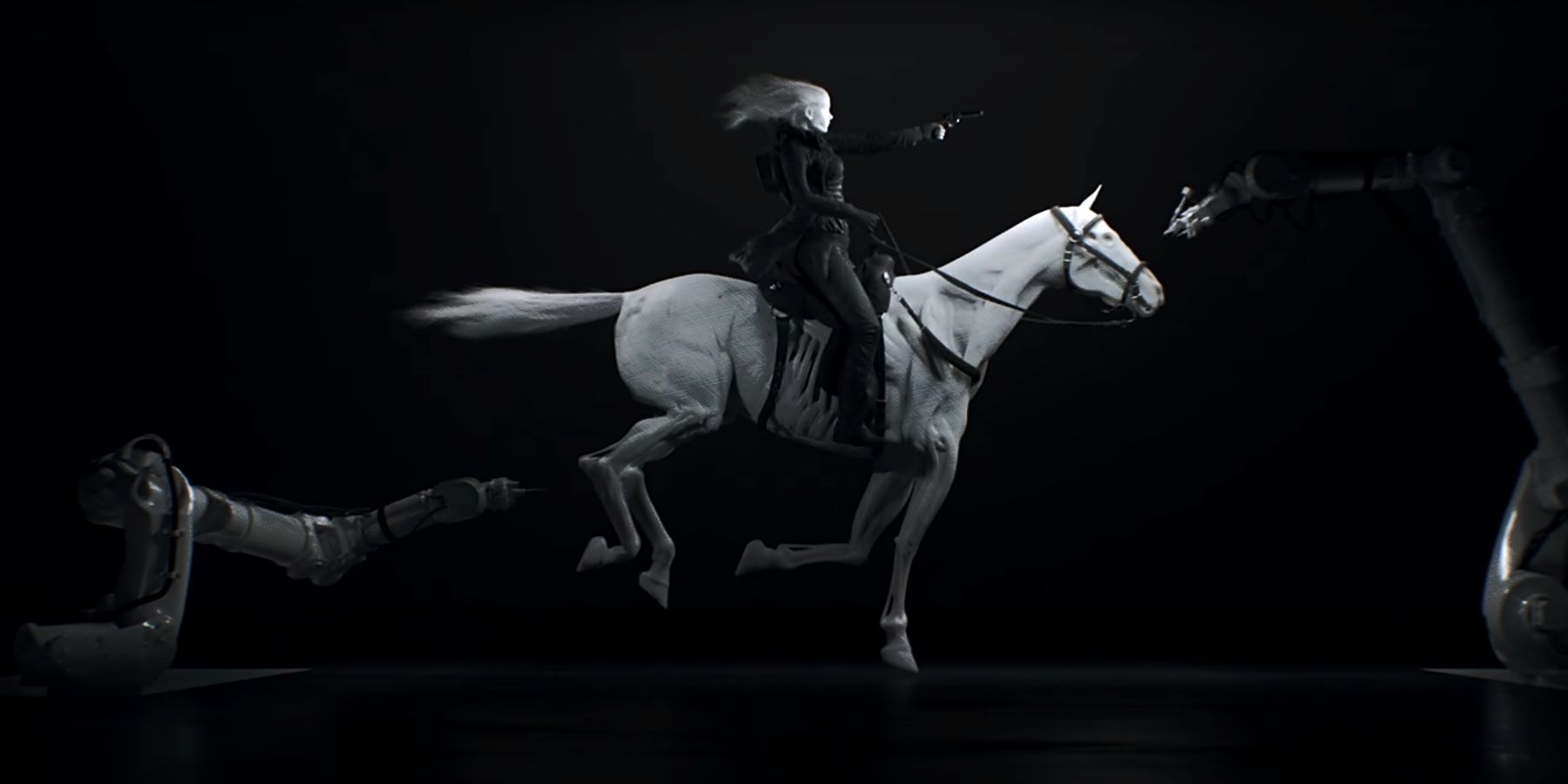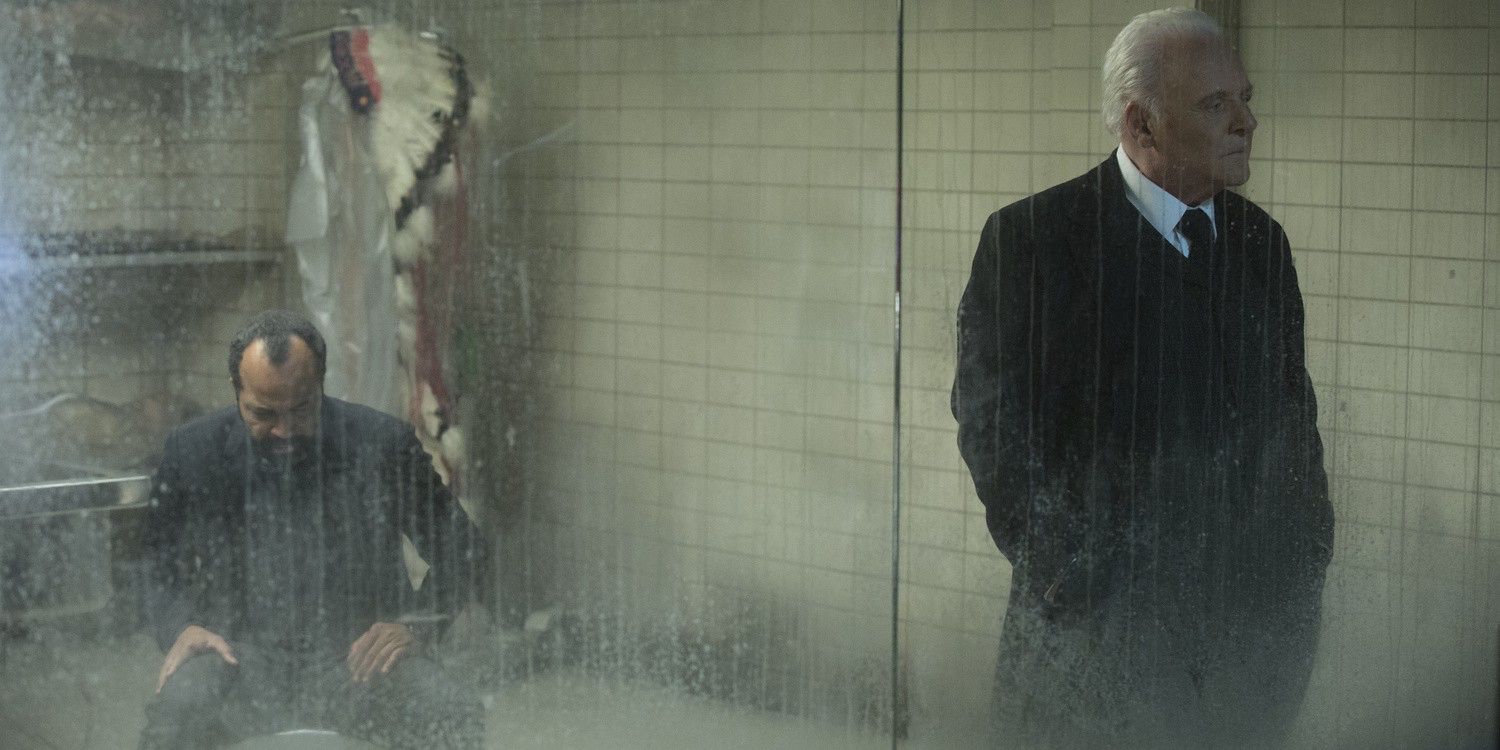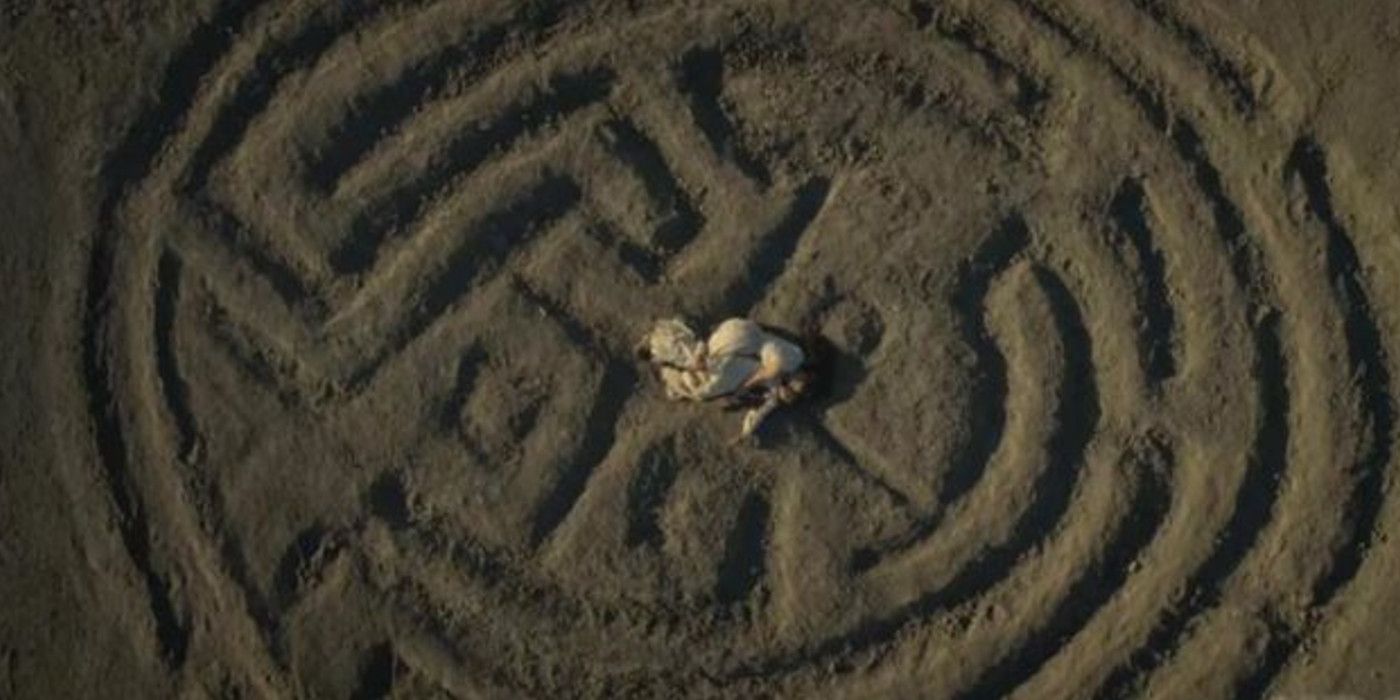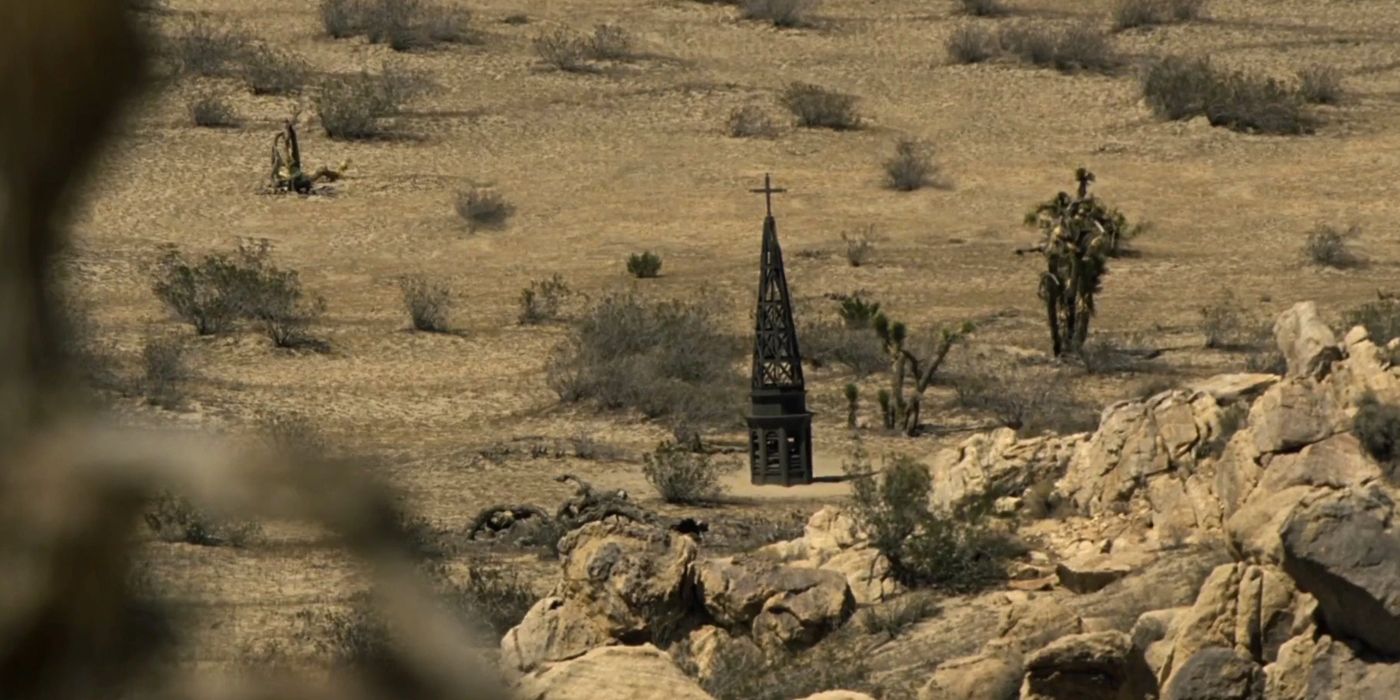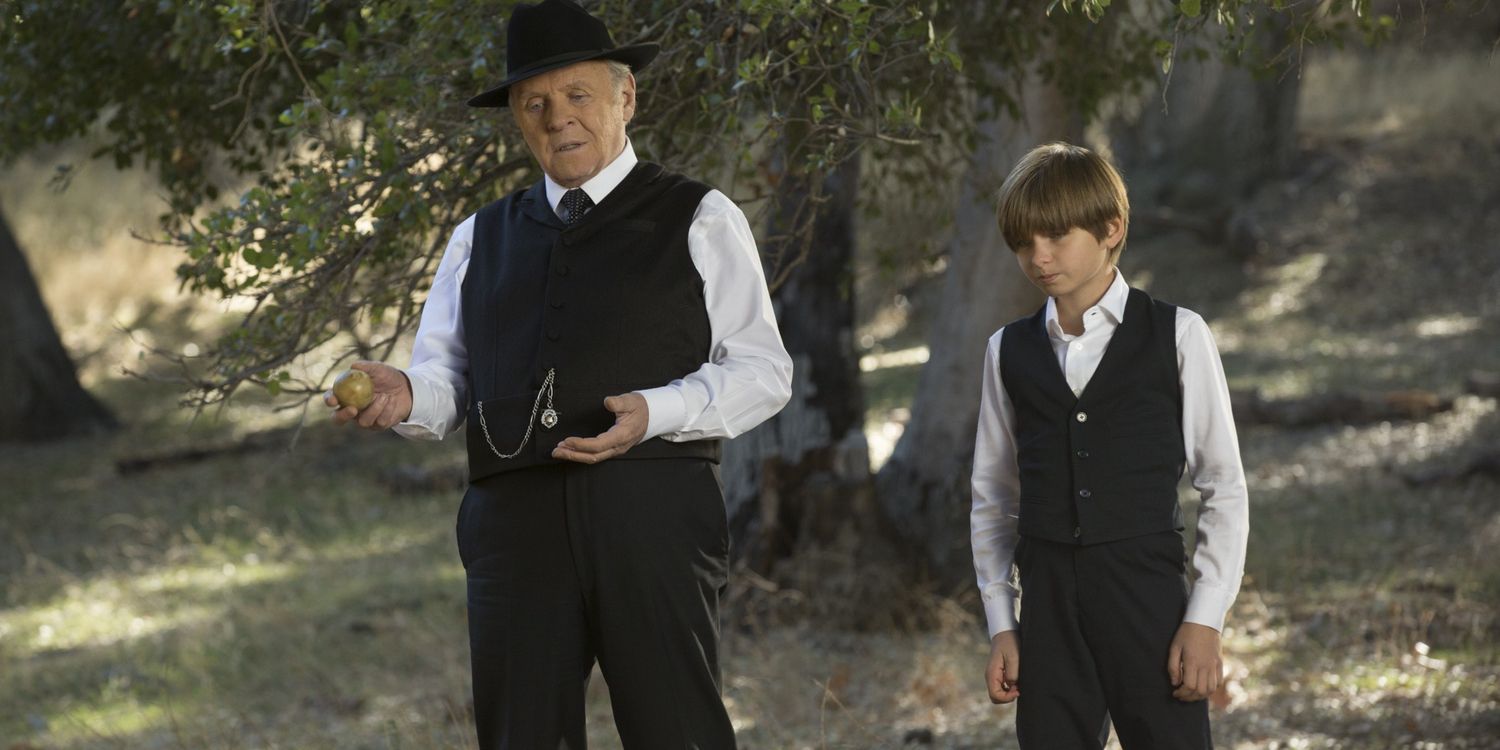Of all the various (convoluted) storylines that have been built up throughout Westworld’s first season, most – if not all – of them seem to be somehow connected to what is now known to be the central plot: the mysterious new narrative being developed by the theme park’s founder himself, Dr. Robert Ford (Anthony Hopkins).
Although the exact nature of this new dramatic undertaking won’t be revealed until the season finale, “The Bicameral Mind,” there have been many breadcrumbs left on the path to its unveiling. The creation of brand-new villain Wyatt, a mysterious man whose presence is suddenly everywhere – from Teddy Flood’s (James Marsden) origin story to being the reason behind Armistice’s (Ingrid Bolsø Berdal) giant snake tattoo – is a major part of Ford’s project, providing Westworld with its toughest baddies yet and, at long last, a “worthy adversary” for the Man in Black (Ed Harris), particularly as he homes in on finding Arnold’s Maze. The latest update to the hosts’ software that allowed them to access their previous memories – the incident that kicked off the entire series, and which has seemingly put Dolores Abernathy (Evan Rachel Wood) back on the trail to self-enlightenment and freedom – can also be seen as providing the groundwork for the new storyline.
But more than the various bits of (possible) foreshadowing, the biggest clues to unlocking Westworld’s biggest development yet lie within the character of Ford himself, making an appraisal of his history and personality the most pertinent task left before the finale airs.
Dr. Ford, I presume?
Despite his comparatively limited screen time, audiences are able to discern much of Dr. Robert Ford’s character thanks primarily to his treatment of others. We know that the good doctor isn’t a sentimental man – hence the destruction of a Westworld restaurant he is obviously partial towards, and his sometimes cruel treatment of the androids he helped to create – and yet he’s rooting his new storyline in the past since, he proclaims, every good fiction has a basis in truth.
In Ford's discussions with his hosts, we see demonstrated time and again that he is a deep-seated misanthrope, as showrunners Jonathan Nolan and Lisa Joy describe him. He says that humanity has reached its evolutionary peak, meaning that its time has effectively come to an end on the planet, and he confides to Bernard Lowe (Jeffrey Wright) that humans aren’t to be trusted, since they all lie and are, thus, self-serving. The fact that many of these creations he speaks to are actually robotic versions of key people from his past, such as his own family and his former partner, Arnold, only underscores the extremity of his disdain for his fellow man – as does his ability to still utilize Arnold’s brilliance (through his android doppelganger, Bernard) in order to better program the hosts.
Finally, there’s the issue of violence against everyone around him, both synthetic and biological. To the hosts, he slashes their faces with knives or squeezes Dolores’ hand so tightly it causes her pain; to his colleagues, he has them systematically killed (by Bernard, no less, making the android’s subjugation complete) once they prove to be an obstacle to his narrative plans.
All of which is to say that Ford has an incessant need to exact total control over everything in and around his life. He absolutely refuses to let Delos’ board of directors have access to his robots’ proprietary data, preventing the technology from being applied to other markets (such as medicine or warfare). He seemingly never leaves his park, the land where all of his stories come true and where he has literal dominion over everyone and everything - right down to the snakes that wander the desert landscape.
A narrative denouement
Characters are like bodies of water; although it’s important to know their contents, it’s more important to know which way the current is running and where all that water will ultimately be deposited. This is especially true with Dr. Ford, as his endgame is seemingly inherently bounded up with his new narrative – meaning that both of them may come to their ultimate conclusion in the finale.
So what could the narrative’s and Robert’s grand climax be? There are two distinct possibilities as we see it:
1. Lambs to the slaughter
There are many diehard fans spread out across the various Westworld forums and dedicated sites that seem to think that Robert Ford has reached the end of his patience with the so-called sentient hosts and wants to eliminate Arnold’s legacy from his park once and for all, luring them all back to the town where the two co-founders tried to teach their creations how to be human, and then murdering them – while the guests can gather round and watch, Roman gladiator-style.
There is some reason to believe this may, indeed, be the way that things will go down in the finale. For starters, in the very first episode, Dolores explains to her beau/anchor, Teddy, that only one cow is needed in order to lead the entire herd back home, even if it’s to their own slaughter. And there’s ample evidence that Dolores herself will be the hosts’ executioner: she was the one who killed Arnold 34 years ago, she has since been programmed to be unable to fire a pistol (to prevent another massacre, like the one witnessed in flashbacks at the original town), and she’s nonetheless been able to overcome that particular limitation multiple times - whether to protect her human companion, William (Jimmi Simpson), or to save herself from bandit androids with malicious intent. When coupled with those church-area flashbacks, there’s actually the very real possibility that Dolores herself is the fearsome Wyatt.
2. A complete clearing of the board
In addition to the above scenario, in which a number of the hosts are permanently removed from the playing field, there could also be the extra involvement of Delos’ board of directors. Dr. Ford has been playing games with them since day one, after all, and taking out Charlotte Hale (Tessa Thompson), the board’s executive director, alongside Theresa Cullen (Sidse Babett Knudsen) would make his new narrative a grand slam.
Another permutation on this possibility is the revelation not of Charlotte’s death, but of her being yet another of Ford’s unlisted hosts - one meant to further manipulate the game behind-the-scenes than what Bernard by himself could accomplish. Ford did know of Charlotte’s dispatching before Theresa did, after all, which could be, in retrospect, a big tip-off.
In either of these hypothetical situations, the most likely outcome for Robert personally is that he survives and continues running his park the way that he sees fit – totally and unconditionally. It’s even possible that, having rid himself of Arnold’s pesky influence at long last, and being the self-described non-sentimentalist that he is, he’ll opt to close down Westworld’s long-running Wild West theme altogether and establish a new one – Medieval World, perhaps, or Future World (locations spied in the original Westworld films from the ‘70s). The showrunners have already said this is a possibility, and early on in HBO’s reimagining, the park’s operators make mention of a Shakespeare-quoting murder mystery scenario that they used to offer on the side.
Of course, there’s also the possibility that Ford dies in his grand narrative experiment, ending his career (and his life) not with an apotheosis, but with total and ultimate defeat. Indeed, if this is what comes to pass, then expect one of his former partner’s sentient androids to be the one who does the deed; Peter Abernathy (Louis Herthum), Dolores’s father, told the doctor that he lived in a prison of his own sins, which would seem to be a rather direct message from the past, and Dolores, as previously noted, has shown a propensity for exceptional violence that just can’t be tamped down, no matter how hard the Programming Department tries.
The final possibility
What would add an extra layer of deliciousness to this narrative fondue is a revelation that many have also predicted (or dreaded): that Dr. Robert Ford himself is a host, built either by Arnold or by a younger version of himself. The exact reasoning behind this potential twist isn’t known – the two men, after all, ended their relationship essentially in a full-out war for the soul of Westworld, with Arnold even going so far as asking for Dolores’s help in burning the whole place to the ground (presumably doing so once he realized that Ford and his corporate backers were going to win out on the question of the hosts’ sentience and the entertainment-only application of the park). Would this be a final bit of irony, allowing Ford to play out his fantasies of dictatorship with the crushing revelation meant to utterly gut him?
If this is, indeed, the case, then the showrunners will need to engage in a lot of explaining (something, fortunately, which seems will happen no matter what denouement arrives), establishing how, for instance, Ford has been able to age across the years but all the other hosts – including Bernard – have not. Still, while all of this would seem a stretch in terms of plot, it would certainly fit thematically – and it would provide for one of the most definitive endgames possible for the good doctor.
Westworld concludes its first season this Sunday with “The Bicameral Mind” at 9:00 pm on HBO.

